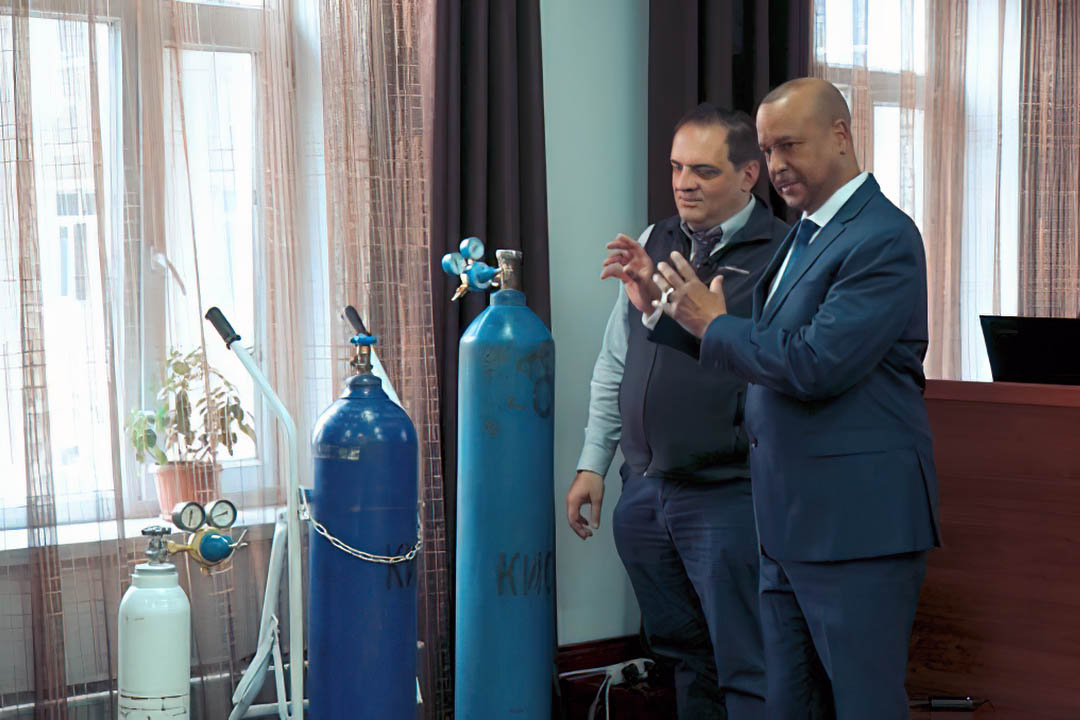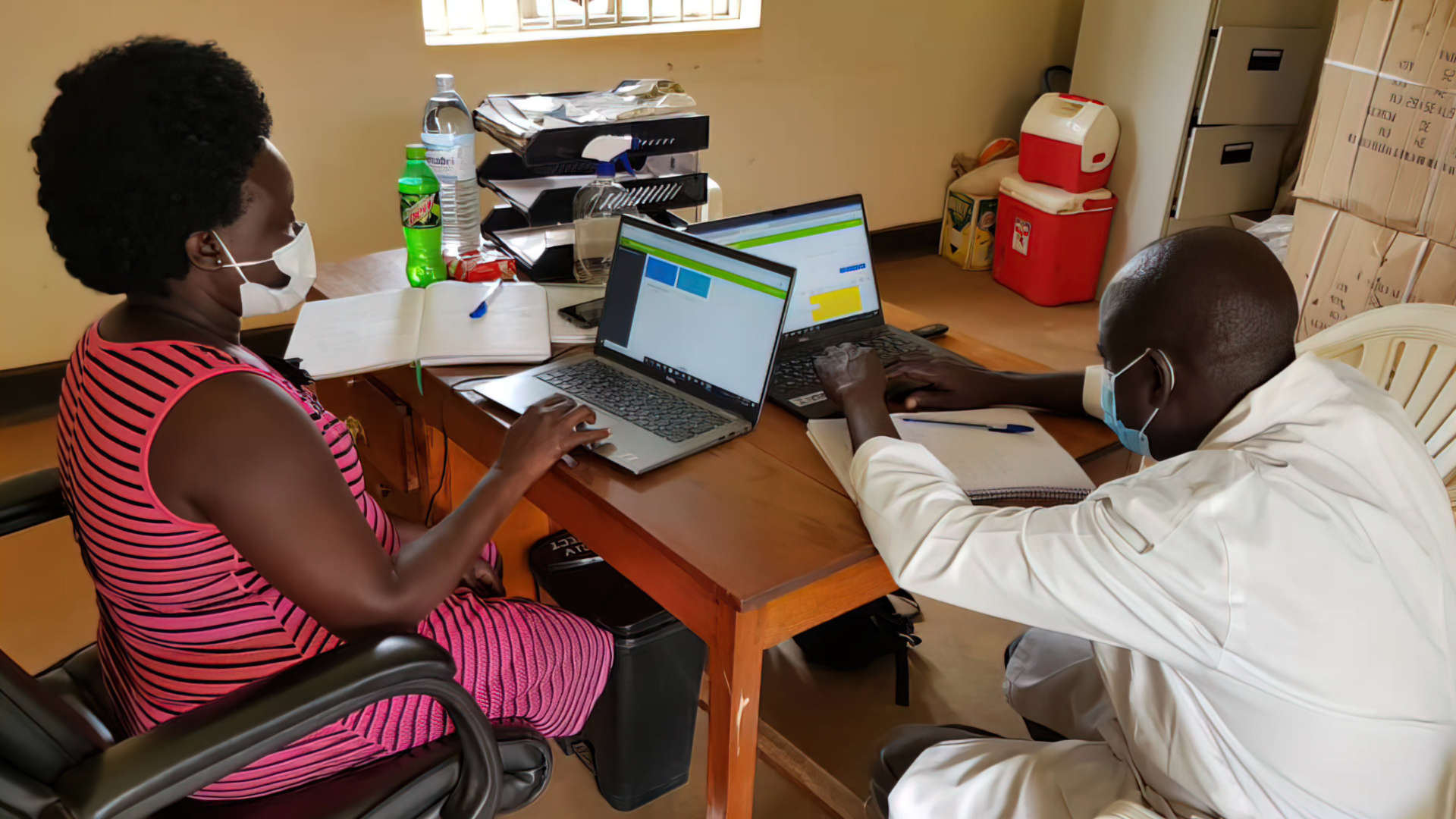Supplemental oxygen is an essential, life-saving treatment for people hospitalized with COVID-19. During the pandemic, many countries have experienced inadequate access to medical oxygen. Managing access to oxygen requires robust systems and technical knowledge to make sure the systems are reliable and safe.
In Tajikistan, the pandemic has generated substantial demand for improved access to oxygen. Medical facilities have experienced oxygen shortages, questions around safety, and challenges with the safe movement and delivery of oxygen cylinders. These challenges highlighted the need for additional training and standardization of procedures for the safe production, handling, and management of oxygen.
As part of its global response to the COVID-19 pandemic, USAID tasked the Global Health Supply Chain Program-Procurement and Supply Management (GHSC-PSM) project, led by Chemonics, with procuring and delivering health commodities, including oxygen-generating pressure swing adsorption (PSA) plants. Likewise, the project was tasked with providing training for oversight and use of the cylinders and PSA plants. This was done to develop skills to locally manage these resources, and to promote sustainability by taking a health systems approach. This support was especially needed because the pandemic forced medical facilities to store, use, and monitor an increased amount of oxygen, often in spaces repurposed for patient care to handle the surge in COVID-19 patients.
In collaboration with the Ministry of Health (MOH), the Tajik Technical University, and the Tajik Adult Training Center, Chemonics and its sub-partner University Research Co., LLC (URC), under the GHSC-PSM project, designed a training program on the management, safe use, correct storage, and monitoring of medical oxygen. The eight-module course featured facility tours, exams, and equipment demonstrations. In January 2022, a team of two GHSC-PSM senior technical advisors traveled to Dushanbe, Tajikistan to conduct a one-week Training-of-Trainers (TOT) Program of the course.
Ensuring Effective Management of Oxygen Systems and Supply
The TOT program ensured that sufficient technical personnel were prepared to conduct the course nationally. The course educates technicians, engineers, and non-clinical support staff of medical facilities on safe handling techniques when transporting oxygen, potential oxygen hazards, and approaches to prevent workplace accidents involving oxygen.
USAID’S GHSC-PSM delivered the TOT Program in English with simultaneous Tajik and Russian interpretation using classroom lectures and hands-on demonstrations. Classroom and field activities enabled participants to learn how to safely manage and transport oxygen cylinders.
Participant Naimov Mahmad Karimovich from Bokhtar Hospital stated: “The course taught us the important lessons about safe handling of oxygen and related equipment. I will share my knowledge from the training with other oxygen specialists.”
Participants included 22 bioengineers and technicians affiliated with the MOH, as well as participants from Chemonics Tajikistan, Tajik Technical University, and the Tajik Adult Training Center of the Ministry of Labour, Migration, and Employment. Technicians were assessed on their comprehension of the topics presented and their ability to safely manage medical oxygen. The GHSC-PSM Project team and the MOH selected three participants to serve as the lead trainers for the cascade training of 136 technicians and bioengineers from medical facilities throughout the country.
With guidance from the instructors, participants were able to identify over 20 guidelines or policies vital to ensuring the safe handling, transportation, and delivery of oxygen for patients and staff. They also could identify the importance of the use of personal protective equipment and cylinder tags, proper storage of oxygen cylinders, the dangers of fire hazards including smoking, and the proper use of shut-off valves.
Expanding Oxygen Training in Tajikistan and Beyond
Post training, the GHSC-PSM Project team toured several hospitals to observe the management of oxygen systems and debriefed officials at the MOH on their findings. They provided recommendations on essential equipment to make available at each hospital for safe handling and management of oxygen cylinders.
They also met with Tajik Technical University faculty members to support the design of a college level curriculum to be offered in the fall of 2022. The team is also working with the MOH to draft a set of guidelines and policies that will be rolled out nationwide when finalized and adopted.
Through this health systems approach and with an aim for sustainability, the USAID-funded GHSC-PSM has been working with MOHs and other key actors in different countries, including Honduras and Kenya, to design similar courses and TOT Programs. Collaboration, training, and proactive practices amongst teams will result in safe and life-saving use of oxygen to ensure patients receive the care they need.



